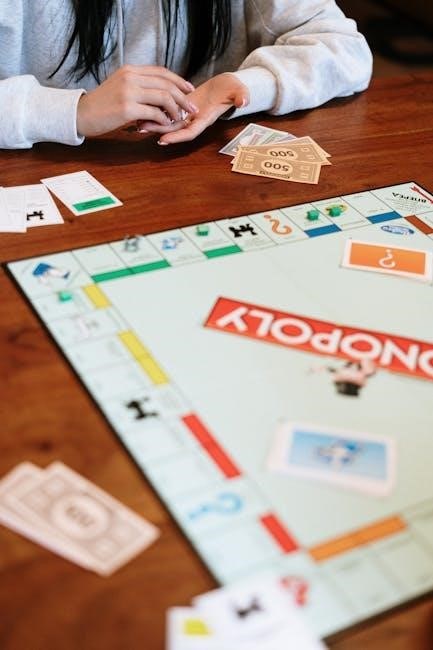Pinochle is a popular trick-taking card game with a rich history‚ blending elements from several European card games. It is known for its strategic depth and social appeal‚ particularly in the United States. The game is typically played with a 48-card deck and involves both trick-taking and melding. Pinochle has become a favorite in many card-playing communities‚ offering a unique combination of skill and camaraderie.
- A classic game with roots in European card traditions.
- Combines trick-taking and melding strategies.
- Popular in the United States for its social and competitive nature.
1.1 Brief History of Pinochle
Pinochle originated in 19th-century Europe‚ evolving from games like Bezique and Binokel. It gained popularity in the United States in the early 20th century‚ becoming a staple in card-playing communities. The game’s name and rules reflect its European roots‚ blending trick-taking and melding strategies. Pinochle’s unique appeal lies in its complexity and social interaction‚ making it a favorite among card enthusiasts for generations.
- Roots in European card games like Bezique and Binokel.
- Gained prominence in the U.S. in the early 20th century.
- Combines trick-taking and melding for strategic depth.
1.2 Popularity and Cultural Significance
Pinochle has endured as a beloved card game‚ cherished for its strategic depth and social interaction. Its popularity peaked in the mid-20th century‚ becoming a staple in community card clubs and tournaments. The game’s intricate rules and competitive nature attract players seeking both challenge and camaraderie. Pinochle’s cultural significance lies in its ability to foster lasting friendships and provide intellectual stimulation‚ making it a timeless favorite among card enthusiasts.
- A timeless classic with enduring appeal.
- Fosters social connections and intellectual challenge.
- Thrives in community clubs and tournaments.

Basic Rules of Pinochle
Pinochle is played with a 48-card deck‚ involving 4 players in partnerships. The goal is to win tricks and score points through melds and trick-taking; Strategic bidding and declaring trump are key elements‚ with specific rules governing card ranks and scoring.
- Played with a 48-card deck.
- Four players in two partnerships.
- Combines trick-taking and melding strategies.
2.1 Number of Players and Deck
Pinochle is traditionally played with four players‚ divided into two partnerships. The game uses a 48-card deck‚ consisting of Aces‚ Kings‚ Queens‚ Jacks‚ 10s‚ and 9s‚ with two copies of each rank per suit. The deck includes four suits: hearts‚ diamonds‚ clubs‚ and spades. Each player receives 12 cards during the deal‚ ensuring an even distribution for strategic play. The deck’s structure and card distribution are fundamental to the game’s balance and complexity.
- Four players in two partnerships.
- 48-card deck with two copies of each rank.
- Each player receives 12 cards.
2.2 Objective of the Game
The primary goal in Pinochle is to accumulate points by winning tricks and forming valid melds. Teams aim to be the first to reach 150 points‚ achieved by taking tricks and declaring combinations like runs‚ marriages‚ and Aces. Each trick won contributes points based on the cards taken‚ while melds offer additional scoring opportunities. The game requires strategic planning to maximize points from both tricks and melds‚ making it a balance of skill and teamwork.
- Win tricks to earn points.
- Form melds for extra points.
- Reach 150 points to win the game.
2.3 Rank of Cards
In Pinochle‚ the card ranks are a key aspect of gameplay. The 48-card deck consists of Aces‚ Kings‚ Queens‚ Jacks‚ 10s‚ and 9s‚ with Aces ranking highest. Each suit contains two of each rank‚ doubling their potential impact. The hierarchy from highest to lowest is: Ace‚ King‚ Queen‚ Jack‚ 10‚ and 9. Trump suit cards hold the highest value‚ influencing both trick-taking and scoring. Understanding card ranks is essential for strategic play and maximizing points.
- Ace is the highest-ranking card.
- Each suit contains two of each rank.
- Trump suit cards hold superior value.

Setup and Dealing
The game begins with dealing all 48 cards equally among four players‚ forming two partnerships. The dealer is part of one team‚ and play proceeds clockwise.
- Four players form two partnerships.
- Cards are dealt evenly to each player.
- The dealer is part of a team.
3.1 How Cards Are Dealt
The 48-card Pinochle deck is dealt equally among four players‚ resulting in each player receiving 12 cards. The dealer‚ who is part of one of the two partnerships‚ handles the distribution. Cards are dealt clockwise‚ starting with the player to the right of the dealer. This ensures an even distribution and prepares the game for bidding and play. The dealing process is straightforward‚ with no additional cards set aside‚ ensuring all cards are in play from the start.
- 48 cards divided equally among four players.
- Each player receives 12 cards.
- Dealing proceeds clockwise‚ starting to the right of the dealer.
3.2 Bidding Process
Bidding in Pinochle is a critical part of the game‚ determining the trump suit and the team’s strategy. The bidding starts with the player to the left of the dealer and proceeds clockwise. Each bid must exceed the previous one‚ with the minimum starting bid at 50 points. Once a bid of 60 is reached‚ increments increase‚ and the bidding becomes more competitive. The highest bidder declares the trump suit and must have a marriage (King and Queen) in that suit. Their partner then passes three cards‚ which the bidder can exchange with their own. This process sets the game’s tone and strategy.
- Bidding begins at 50 points‚ increasing in increments.
- Trump is declared by the highest bidder‚ who must hold a marriage.
- Card passing between partners follows the bid to strengthen the bidder’s hand.

Gameplay Mechanics
Pinochle’s gameplay revolves around declaring trump‚ following suit‚ and taking tricks. The highest bidder sets the trump suit‚ and players must follow suit if possible. Trump cards outrank all others‚ and the goal is to win tricks to score points. Melding combinations‚ like runs or marriages‚ adds strategic depth. Each trick won contributes to the team’s score‚ and achieving the bid’s points is crucial for victory. Skillful play and teamwork are essential to master Pinochle’s intricate mechanics.
- Trump suit determines the hierarchy of card rankings.
- Players must follow suit to remain in compliance.
- Tricks won translate directly into points for the team.
4.1 Declaring Trump
Declaring trump is a pivotal moment in Pinochle‚ typically done by the highest bidder. The bidder names the trump suit‚ which determines the game’s strategy. To declare trump‚ the bidder must hold a “marriage” in the chosen suit‚ ensuring they can meet the bid’s requirements. The trump suit elevates its cards above others‚ influencing both trick-taking and melding opportunities. Properly declaring trump aligns with the bid’s points‚ maximizing potential scores from both tricks and melds. Strategic trump selection is crucial for achieving the bid’s objectives and securing victory.
- The highest bidder typically declares the trump suit.
- A “marriage” in the trump suit is often required.
- Trump cards hold the highest rank during gameplay.
4.2 Following Suit and Trick-Taking
In Pinochle‚ players must follow suit if possible. If unable‚ they may play a trump card‚ which ranks highest. The goal is to win tricks‚ as they contribute to the game’s score. Each trick won earns points based on the cards’ values. Teams aim to accumulate points through strategic trick-taking‚ complementing meld scores. Properly following suit and strategically using trump cards are essential for maximizing trick-related points and achieving victory.
- Players must follow suit unless they cannot.
- Trump cards outrank all other suits in trick-taking.
- Winning tricks directly contributes to the team’s score.

Melding Rules
Melding in Pinochle involves declaring specific card combinations for points. Common melds include runs‚ marriages‚ and aces‚ each with varying point values. Teams earn points by declaring valid melds during the game.
- Runs and marriages are key melding combinations.
- Aces across all suits score significant points.
- Melds must be declared during the appropriate phase.
5.1 Common Melds and Their Points
In Pinochle‚ common melds include runs‚ marriages‚ and aces. A run consists of sequential cards in the trump suit‚ worth 150 points. A marriage (King and Queen of the same suit) scores 100 points if in the trump suit. Aces in all four suits‚ known as “100 aces‚” award 100 points. A royal marriage (King and Queen of the trump suit) adds 20 points to a run. These combinations are essential for maximizing scores‚ with points varying based on the specific meld and trump suit declared.
- Run in trump suit: 150 points.
- Marriage: 100 points in trump‚ 50 in other suits.
- 100 aces: 100 points.
- Royal marriage: 20 bonus points with a run.
5.2 Scoring Melds
Scoring melds in Pinochle requires declaring valid combinations during the bidding phase. Points are awarded based on the type and rarity of melds. A minimum of 20 points in melds is needed to record them. Common melds like runs‚ marriages‚ and aces contribute directly to the score. Bonus points are awarded for rare combinations‚ such as a royal marriage‚ which adds extra points to a run. Teams must meet the minimum bid requirements to count their melds‚ making strategic declaration crucial for maximizing points.
- Melds must be declared during the bidding phase.
- Minimum 20 points required to count melds.
- Bonus points awarded for rare combinations.
- Only the bidding team’s melds are counted.

Trick Scoring
Points from tricks are earned by winning individual tricks during gameplay. Each trick won contributes to the team’s score based on the cards taken. High-ranking cards like Aces and Kings score more points‚ while 10s and 9s score fewer. The team that wins the most tricks earns the majority of the trick points‚ which are added to their meld scores. Trick scoring is a critical component of reaching the game’s winning target of 150 points.
- Points awarded based on card ranks in tricks.
- High-ranking cards contribute more points.
- Trick points combined with meld points.
6.1 Points from Tricks
Points from tricks are awarded based on the rank of cards won in each trick. Aces are worth the most points‚ followed by Kings‚ Queens‚ Jacks‚ 10s‚ and 9s. Each trick’s points are tallied and added to the team’s score. The goal is to accumulate points through strategic trick-taking to reach the game’s target score of 150 points. Teams must balance trick-winning with melding to maximize their total points effectively.
- Aces‚ Kings‚ Queens‚ Jacks‚ 10s‚ and 9s score points.
- Points from tricks add up to reach the 150-point target.
- Strategic trick-taking balances melding and scoring.
6.2 Winning the Game
The game is won when a team reaches a total score of 150 points‚ combining points from tricks and melds. Teams must balance their strategy between securing high-value tricks and declaring lucrative melds. The final score is determined by adding the points from tricks and melds‚ ensuring accuracy. The team that first achieves 150 points is declared the winner‚ showcasing their mastery of both trick-taking and melding strategies.
- A total of 150 points wins the game.
- Points from tricks and melds are combined.
- Strategic play balances trick-taking and melding.
Advanced Strategies
Advanced players master strategic bidding‚ trick management‚ and card flow. They anticipate opponents’ moves and optimize meld declarations. Effective communication with partners enhances teamwork and tactical execution‚ ensuring victory.
- Strategic bidding to control the game flow.
- Optimizing trick-taking and meld declarations.
- Anticipating opponents’ moves and strategies.
7.1 Strategic Bidding
Strategic bidding is crucial in Pinochle‚ as it sets the game’s direction. The minimum starting bid is typically 50‚ with increments increasing as the bidding progresses. Players must carefully assess their hands to determine viable bids‚ considering potential melds and trump suits. Winning the bid requires declaring the trump suit and ensuring a “marriage” (King and Queen) in that suit. Experienced players use bidding to communicate with partners and outmaneuver opponents‚ balancing risk and reward to secure advantageous positions.
- Bidding starts at a minimum of 50 points.
- Incremental increases shape the game’s strategy.
- Winning the bid requires a “marriage” in the trump suit.
7.2 Tips for Winning
To excel in Pinochle‚ master strategic card management and communication with your partner. Focus on scoring 150 points by securing high-ranking cards in tricks and achieving valuable melds. Prioritize trump cards‚ as they hold the highest value‚ and aim to control the game’s flow. Effective signaling through bids and plays is essential for coordination. Avoid wasting strong cards early and save them for critical moments. Experience and adaptability are key to outsmarting opponents and securing victory.
- Master card management and partner communication.
- Focus on high-value cards and melds.
- Control the game flow with strategic plays.

Optional Rules and Variations
Optional rules and variations allow customization‚ enhancing gameplay for different groups. These include additional melds‚ modified scoring‚ or alternate bidding systems‚ offering flexibility and variety to players.
- House rules may introduce unique scoring or bidding tweaks.
- Regional variations add diverse gameplay styles.
- Customizations suit different player preferences and skill levels.
8.1 House Rules and Modifications
House rules and modifications allow players to tailor the game to their preferences. Common adjustments include changing the minimum bid‚ altering meld point values‚ or modifying how trump marriages and runs are scored; Some groups also introduce unique meld combinations or adjust the number of cards passed during the bidding phase. These customizations ensure the game remains dynamic and enjoyable for diverse player groups‚ balancing tradition with personal preference.
- Custom meld point values for strategic depth.
- Modified bidding minimums to suit skill levels.
- Unique meld combinations for variety.
8.2 Regional Variations
Regional variations of Pinochle introduce unique twists‚ reflecting local gaming cultures. Some areas use single-deck rules‚ while others prefer double-deck for faster gameplay. Scoring systems also differ‚ such as varying points for runs or aces. Bidding styles may change‚ with some regions starting bids at 50 or using incremental increases after reaching 60. Additionally‚ certain regions have adopted special melds or altered rules for trump declarations. These variations keep the game fresh and tailored to local preferences.
- Single vs. double-deck formats.
- Different scoring for runs and aces.
- Unique bidding styles and increments.
Pinochle is a timeless card game offering strategic depth and social fun. Its unique blend of trick-taking and melding ensures lasting enjoyment for players of all skill levels.
9.2 Resources for Further Learning
9.1 Final Thoughts
Pinochle is a captivating game that combines strategy‚ skill‚ and social interaction. Its rich history and intricate rules make it a timeless favorite among card enthusiasts. Whether played casually or competitively‚ Pinochle offers a unique challenge that appeals to players of all skill levels. The game’s depth and complexity ensure that there is always room to improve‚ making it a rewarding experience for those who master its nuances. Pinochle truly stands out as a classic card game with enduring appeal.
- A game that blends strategy and skill seamlessly.
- Perfect for both casual and competitive play.
- A timeless classic with universal appeal.

Leave a Reply
You must be logged in to post a comment.